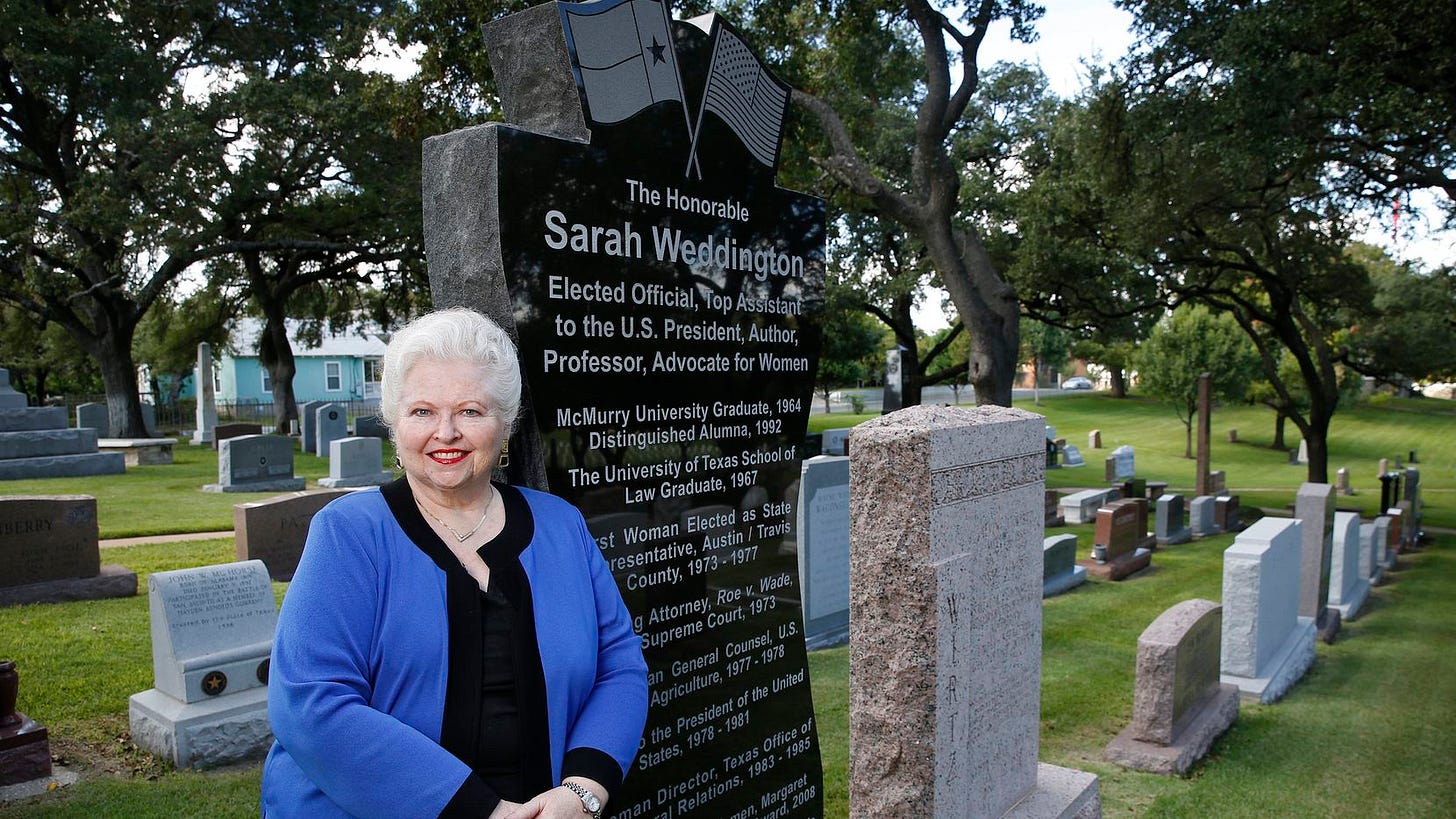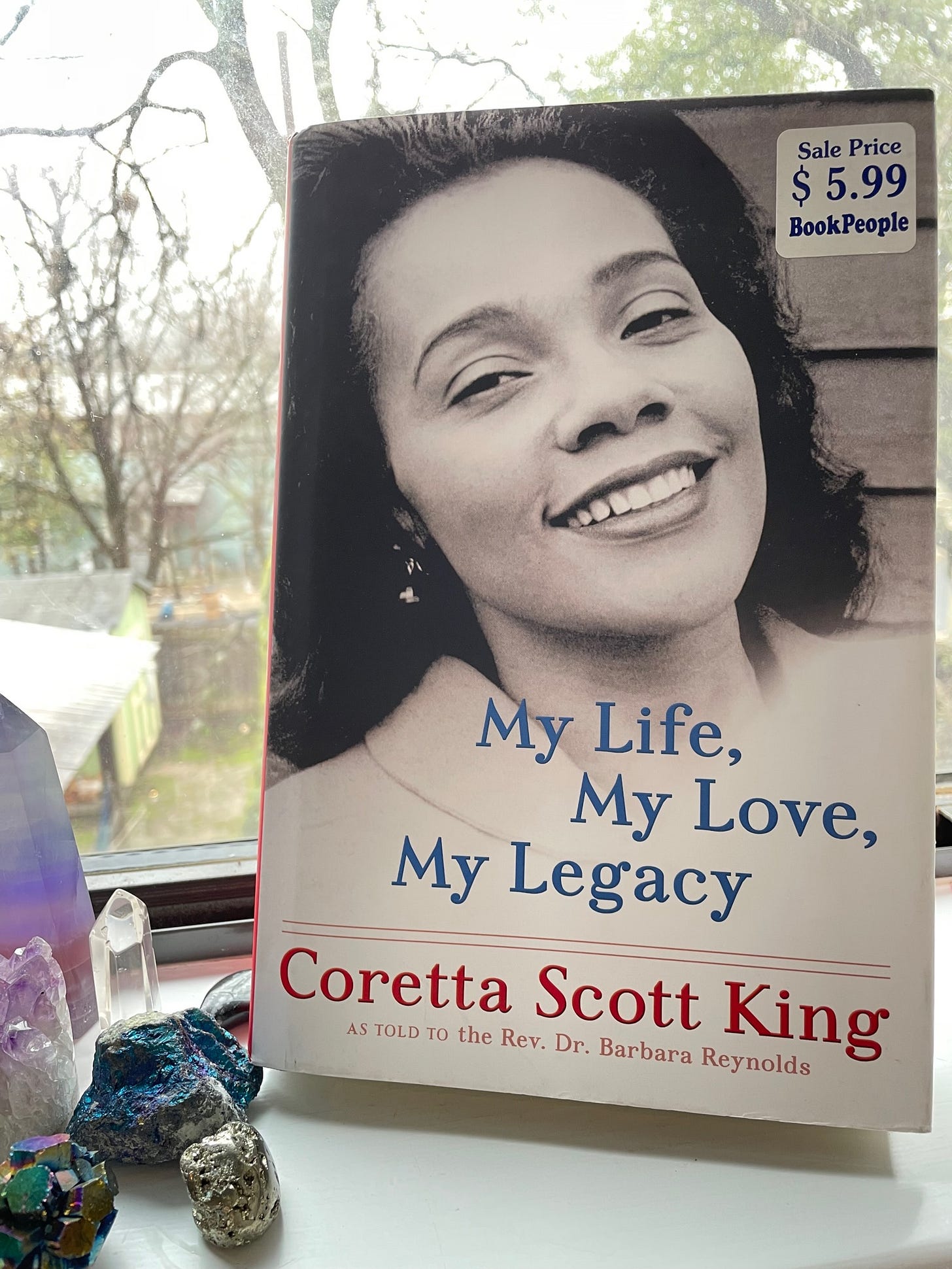During the third week of January when our social media feeds were brimming with MLK, Jr. quotes, one post leapt out at me. It was from Bernice King, Martin Luther King, Jr.’s daughter. She said, “As you honor my father today, please remember and honor my mother, as well. She was the architect of the King Legacy and founder of The King Center, which she founded two months after Daddy was assassinated. Without Coretta Scott King, there would be no MLK Day.”
As I read Bernice’s plea to remember her mother, I was transported back to the Texas State Cemetery where I had wandered among the gravestones a few days before. I sometimes go there when I feel the pull to connect with my chosen ancestors–Ann Richards, Barbara Jordan, and soon to join them, Sarah Weddington.
Sarah Weddington passed on December 26, 2021, less than a month before the 49th anniversary of Roe v. Wade, the Supreme Court decision she won when she was just 26 years old. In between arguing and winning that landmark case, she was also the first woman elected to the Texas House of Representatives from Austin/Travis County.
I had the honor of seeing Sarah Weddington speak a handful of years ago at an event put on by Annie’s List, a group that works to elect more Texas women. The two things I remembered most from her speech were the soft, white cloud of hair suspended above her and the fiery aside she gave about claiming a spot in the Texas State Cemetery amongst all the men buried there.
Ms. Weddington had clearly been thinking about her legacy for a long time. She’d picked out her plot and had her headstone engraved well before her death. In a 2012 remembrance of her friend the former Texas Governor Ann Richards, Weddington wrote, “My gravesite is about 50 feet away from hers. Hopefully, when I call the Texas State Cemetery home, we will have great late-night conversations, remembering our battles of the past and celebrating the victories that live after us.”
As I walked back through the cemetery after visiting Ann and Sarah and Barbara’s graves, I noticed something. All this time I’d thought there were only a handful of women buried in the state cemetery, but I was wrong. There are only a handful of women who are acknowledged as being buried in the state cemetery. The vast majority of the women buried there share a headstone with their more famous husbands or sons.
While the man’s side of the headstone usually lists illustrious titles, the woman’s side usually looks something like this:
Devoted wife.
Mother.
Teacher.
Volunteer.
What is between those lines, I wonder?
Since MLK Day and Bernice King’s plea to remember her mother, I’ve been reading more about Coretta Scott King. “I am made to sound like an attachment to a vacuum cleaner,” a friend recalled her saying, “the wife of Martin, then the widow of Martin, all of which I was proud to be. But I was never just a wife, nor a widow. I was always more than a label.”
When they met, Coretta was more involved in politics than MLK, Jr. And though she was remembered in the media as “obedient” after her death, she had the traditional vow “to obey” stricken when they married in 1953. Martin had expected her to stay home with their children during the civil rights movement, but Coretta had other ideas. She was an activist in her own right and often pushed MLK, Jr. to be even more progressive on issues like the Vietnam War.
As I’ve been pondering the relationship between gender and legacy, I remembered an incident my mother-in-law Elizabeth Lesser relays in her book Cassandra Speaks: When women are the storytellers, the human story changes. Years ago she was asked to speak at a gathering of world religious leaders and scientists in Austria. She was one of only two women invited to speak–the other was writer Isabel Allende.
Isabel Allende was the first speaker at the conference, and when the moderator asked her the question of the day, “What will your legacy be?” Isabel answered, “Legacy? Why would I care about legacy? I’ll be dead! And anyway, legacy is a penis word.”
My mother-in-law goes on to describe the scene: “The monks in the first rows blushed; a couple of people gasped… The Dalai Lama laughed out loud.”
Isabel went on to criticize not penises, per se, but patriarchy and the urge to be remembered “as the greatest, the best, the richest, the smartest.” She said it was time to elevate a new kind of hero: “People who prioritize love and food and care of the children and old people–brave endeavors historically relegated to the ‘unimportant’ spheres of women. And therefore, she said, it was time to elevate women as the people who can get us out of the crazy mess humanity has gotten itself into.”
Or as Coretta Scott King said back in 1968: “Women, if the soul of this nation is to be saved, I believe you must become its soul.”
What could be more heroic and deserving of monuments than saving the soul of a nation? Is a bloody death on a battlefield more worthy of remembrance than a life of quiet service? Ultimately, no matter how we live our lives the decisions about how we are remembered are made by those we leave behind.
At the time of his assassination, Martin Luther King, Jr. was disliked by 75% of Americans. THE reason he is remembered as an American icon is because of Coretta Scott King’s painstaking efforts to build the MLK, Jr. legacy as we know it today.
Almost immediately, Coretta threw herself into plans for a multi-million dollar King Center, “a kind of international West Point of nonviolence,” that is still going strong. She pushed for 15 years to make MLK Day a national holiday, recruiting the help of everyone from Stevie Wonder to Jimmy Carter to Newt Gingrich.
It was impossible to go through January 17th of this year without hearing the name MLK many times. But did you hear the name Coretta Scott King on January 30? Coretta and MLK’s daughter Bernice wrote: “...When she left me 16 years ago today she left me with an assignment to not just continue my father MLK’s legacy, but to establish her legacy… She built the largest Global Social Change Brand in the world. Fifty-four years after my father was assassinated, the world is still looking to, learning from, and utilizing his teachings. Because of Mrs. Coretta Scott King, we know more than ‘I Have a Dream.’”
From one of the most hated men in America to “the largest Global Social Change Brand in the world.” What an incredible feat. Because of Coretta Scott King’s visceral knowledge of what it takes to build a legacy, she understood the importance of appointing a capable architect to establish her own.
Legacy is an agreement between the one who stands on the lonely gravesite at the top of the hill and shouts, “This life mattered! This life taught us how to be better to each other!” and the one who hears their cry and says, “Thank you, I’m listening. I am better because of them. I won’t forget.”
I heard Bernice’s shout from her mother’s graveside and took myself to the bookstore the next day. My heart broke a little when I asked where to find Coretta Scott King’s autobiography and they directed me to either the “sale” section or the “last chance” section.
What is the value of a legacy? Whose autobiography is full price and whose is discounted to $5.99?
Who shouts for us after we take our last breath?
Sarah Weddington clearly put a lot of thought into the content of her headstone. It’s one of the taller ones in the Texas State Cemetery and perhaps the most resumé-like of them all.
She asked the headstone maker to pinch the sides in so it would have the shape of a woman.
In 1967, when Sarah was 22, birth control was only available to unmarried women if they could certify to a doctor that they were within 6 weeks of their wedding day. So when Sarah became pregnant in her last year of law school she crossed the border into Mexico with her boyfriend for an illegal abortion.
It’s difficult to imagine that Sarah Weddington could have argued Roe v. Wade AND won an election to the Texas House of Representatives all at the age of 25 while ALSO caring for a 2.5-year-old.
Sarah Weddington made the decision not to have children and perhaps that’s why we’ve had the right to choose what we do with our own uteruses for the past 49 years.
Sarah Weddington was never a mother, but she is a foremother to us all.
So while Coretta has Bernice to shape her legacy, Sarah Weddington is counting on us, the heirs of the movement for bodily autonomy, to shout her story, to learn her lessons, to carry on her work.
I, for one, refuse to let “legacy” be a “penis word.”
The public is invited.
You are invited.
Come shout, “This life mattered!” from a grave on a hillside.
But let’s not stop there. Let’s go to the women in our family tree or in the apartment next door. Let’s learn each other’s stories while we’re here so we can fill in the lines between “mother, wife, volunteer” for each other when we’re gone.
At the end of the chapter on “Legacy” in her book Cassandra Speaks, my mother-in-law Elizabeth Lesser suggests we take some time to write our own obituaries, answering questions like, “What made her come alive?” and “What did she stand for?”
I’d like to take it further. What if we then shared our obituaries with each other?
What if we shed the corset of expectation and revealed the soft, supple, imperfect shape of our truest selves and our rawest longings?
I imagine that daring to show each other our souls is the first step toward collectively becoming the “soul of the nation,” just as Coretta Scott King believed we could.

Please join me for a virtual book club with Kathryn Kolbert, the co-author of Controlling Women: What we must do NOW to save reproductive freedom this Wednesday, 2/2 at 8pm CT










